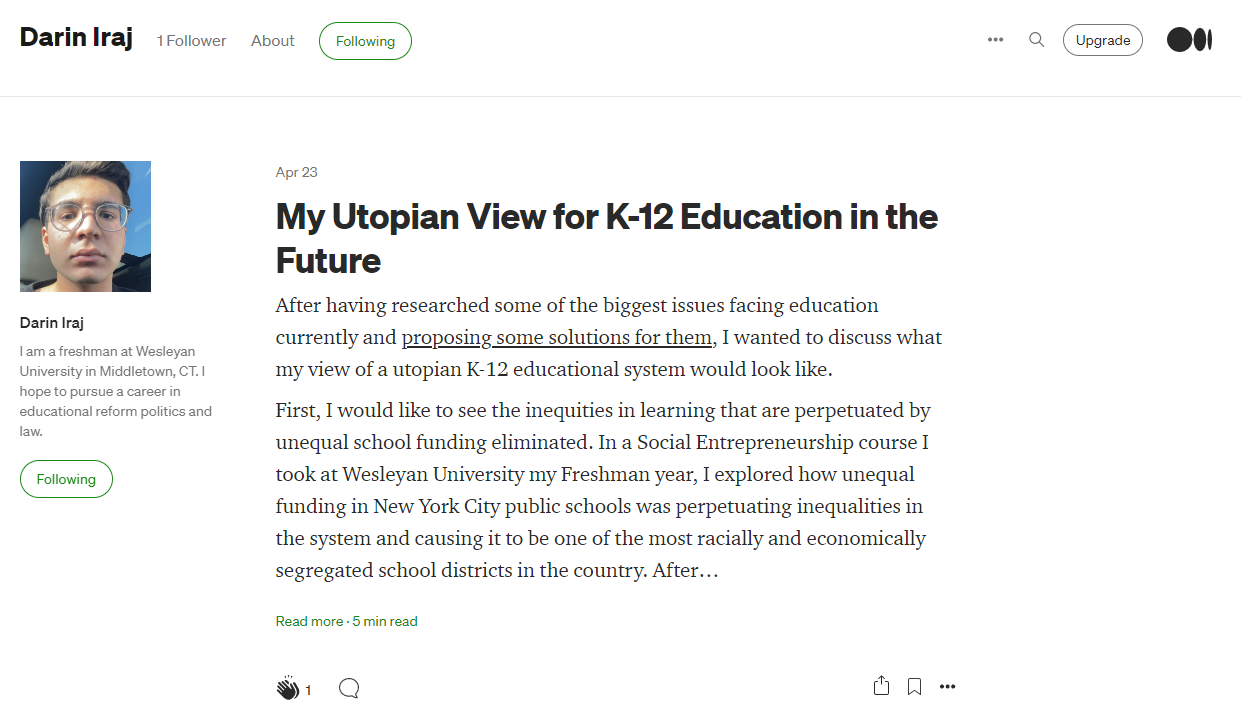My Engaged Project aimed to analyze the impact that pandemics and educational disruptions have had on the United States educational system and propose practices that could be improved upon and added for future pandemics.
I conducted my research by first examining differing padenmics within the education field and decided to further investigate the 1918 Spanish Flu, 1937 Polio Outbreak (specifically in the epicenter, Chicago), 2009 H1N1 Pandemic, 2014 Ebola Pandemic in West Africa, and the 2020 COVID-19 Pandemic. Within each pandemic, I mainly read peer-reviewed and journal articles and focused on the disruptions in education regarding in-person learning, the alternative measures and approaches to learning taken, the overall impact on students and curriculum, how educator preparation shifted, the overall impact on equity, and lessons or strategies which both did and did not work well.
From this, I created three different blog posts. They were titled A reflection on COVID-19 virtual learning: We need to do better, Schools have been unprepared for each health-related closure since 1918. It is time for change, and My Utopian View for K-12 Education in the Future. I also created a research summary which summarizes all the research I did.
Sponsor: Christopher McGilverly –College of Education, Angelo State University, Instructional Designer and Founder/Exec-Director of The Leaders Readers Network
Student reflection excerpt:
I learned a lot this field as a whole. My research ended up serving as a foundation to my final product and allowed me to develop more knowledge regarding the topic as well as incorporate historic evidence to make conclusions about the modern-day school system. I also learned a lot about researching and efficiently summarizing a large amount of research to form conclusions. It was definitely a great learning experience and I am much better prepared to do a similar project in the future.
Some things I would have done differently:
-Narrowing down my idea/specificity of research from the start
-Cite sources during the research phase or hyperlinking them
-Spacing out the workload more efficiently– do not create deadlines which were ahead of the true deadlines, which created stress to have work done before it was truly due.
-Try to narrow down a focus and medium early-on
-Try to research more specifically rather than broadly (to some extent)
-Create a more reasonable timeline giving myself breaks in between submissions
-Create research questions to tackle
-Also focus more on potential room for further research and investigation
-More emphasis on the bigger picture/overall meaning (the “so what?”)
Instructor reflection:
I can’t tell you how impressed I am by your academic curiosity, your research and organizational skills, and your professionalism. Your work is substantive and direct, and it is both deep and broad. I know you feel like you could have done an even better job defining your topic and medium sooner, but I think you did things just right! I hope you will continue to share your research-backed ideas with various audiences through various media in the years to come. You have important things to say, and future K-12 students will benefit by having your voice at the important tables. P.S. It just hit me that there is something especially meta about your work this semester. The Engaged Projects course was designed as an educational response to COVID-19 – to minimize Zoom fatigue, promote student agency, and infuse interpersonal relationships (e.g. with a Sponsor or Cohort) into a largely independent learning experience. How fitting that you studied and wrote about pandemic-induced educational changes in a class that was induced by a pandemic!


